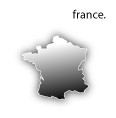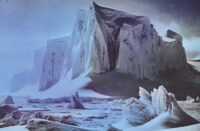
>>> Key
::..:::…..:..::….:::::..:::..:::::::……:::…::.:::….::::..:..:::…::…….::::
 :: Wilt is James P. Keeler and As Giants Watch Over Us is his third and most provocatively strange work yet on Ad Noiseam after formerly issuing material on Mystery Sea and Crionic Mind. Some of the captured sound sources here were contributed by Miles Tilmann and Steve Brand (formerly Augur). The dark balance is metered by a lush scape of ecstatic superimpositions that blend a noir atmosphere with twinkling luminosity as unfurled in the timeless “The Mystery of Iniquity.” Are people still using the term “illbient”? Well, I will just have to call this non-conformist, because it is more a radio play than a recording containing thirteen distinct tracks. It most certainly abbreviates a subtly different tale for each listener. “The Fiddler and the Fool,” while a bit maniacally industrial sounding towards its end, plays between contorted cassette voices, a sweeping Orwellian soundtrack and curious percussion. Once again, through a gauzy haze, Keeler has created a bizarrely psychedelic view of the world. Vignettes of experimental noise like this do not come around often enough, and when you listen to this you will see the intricacies of an impending doom – not just the big rush of static havoc. This is seeded in his “Media Labyrinth” – a field of changing tonalities that is not at all casual. Clunking radio transmissions and watery lines draw cave drawings and stick figures in my head. The buzz drone on the god speak of “Engineering Eternity” hosts a turnkey of abrupt percussion glitches that find Keeler tinkering away, taking risks by composing instantly and live, then going back to master, mix and otherwise “decompose” the final work.
:: Wilt is James P. Keeler and As Giants Watch Over Us is his third and most provocatively strange work yet on Ad Noiseam after formerly issuing material on Mystery Sea and Crionic Mind. Some of the captured sound sources here were contributed by Miles Tilmann and Steve Brand (formerly Augur). The dark balance is metered by a lush scape of ecstatic superimpositions that blend a noir atmosphere with twinkling luminosity as unfurled in the timeless “The Mystery of Iniquity.” Are people still using the term “illbient”? Well, I will just have to call this non-conformist, because it is more a radio play than a recording containing thirteen distinct tracks. It most certainly abbreviates a subtly different tale for each listener. “The Fiddler and the Fool,” while a bit maniacally industrial sounding towards its end, plays between contorted cassette voices, a sweeping Orwellian soundtrack and curious percussion. Once again, through a gauzy haze, Keeler has created a bizarrely psychedelic view of the world. Vignettes of experimental noise like this do not come around often enough, and when you listen to this you will see the intricacies of an impending doom – not just the big rush of static havoc. This is seeded in his “Media Labyrinth” – a field of changing tonalities that is not at all casual. Clunking radio transmissions and watery lines draw cave drawings and stick figures in my head. The buzz drone on the god speak of “Engineering Eternity” hosts a turnkey of abrupt percussion glitches that find Keeler tinkering away, taking risks by composing instantly and live, then going back to master, mix and otherwise “decompose” the final work.
::..:::…..:..::….:::::..:::..:::::::……:::…::.:::….::::..:..:::…::…….::::
 :: We are adrift in special gases unknown on the latest by Cologne-based sound artist, guitar man Joseph Suchy. Calibi.Yau opens new passages to further recreation in unknown, intangible space. Creating a virtual environment, he stresses pure atmosphere on this recording. His radical tonal structures are haunted with partially excerpted stories. Leagues below the surface of the highest seas, bubbly jingles are lengthened as Suchy appeases with his stringed instrument. With ancient bells and sorcerer-like gongs “su-um” is more like a late night walk through a village in Indonesia than a concert in a stuffy room. These nine tracks blend into one with reverse mixing techniques and other random filters and effects to give the overall sincere tone of the work. Stephan Barnickle’s use of various chimes and other percussion only compliments the synthesis between acoustic and digital on “ka-asam” and “uum-u.” Taking a meditative tact on “moo-ay” Suchy centers the soul, and massages the mind. The track is like a tiny brook somewhere in the middle of the backwoods of Vermont, untouched by industry, flowing for centuries, uninterrupted….only by the multiplying angelic vocal by Stephanie Tiersch in the final thirty seconds. The melodic strings recipe keeps the whole recording pretty central to Suchy’s sensitivities to his core environment, playing, musing, and daydreaming aloud. This is a great example where you can shoot out into deepest space and return to earth seemingly unmodified on the surface, while pushing several human buttons.
:: We are adrift in special gases unknown on the latest by Cologne-based sound artist, guitar man Joseph Suchy. Calibi.Yau opens new passages to further recreation in unknown, intangible space. Creating a virtual environment, he stresses pure atmosphere on this recording. His radical tonal structures are haunted with partially excerpted stories. Leagues below the surface of the highest seas, bubbly jingles are lengthened as Suchy appeases with his stringed instrument. With ancient bells and sorcerer-like gongs “su-um” is more like a late night walk through a village in Indonesia than a concert in a stuffy room. These nine tracks blend into one with reverse mixing techniques and other random filters and effects to give the overall sincere tone of the work. Stephan Barnickle’s use of various chimes and other percussion only compliments the synthesis between acoustic and digital on “ka-asam” and “uum-u.” Taking a meditative tact on “moo-ay” Suchy centers the soul, and massages the mind. The track is like a tiny brook somewhere in the middle of the backwoods of Vermont, untouched by industry, flowing for centuries, uninterrupted….only by the multiplying angelic vocal by Stephanie Tiersch in the final thirty seconds. The melodic strings recipe keeps the whole recording pretty central to Suchy’s sensitivities to his core environment, playing, musing, and daydreaming aloud. This is a great example where you can shoot out into deepest space and return to earth seemingly unmodified on the surface, while pushing several human buttons.
::..:::…..:..::….:::::..:::..:::::::……:::…::.:::….::::..:..:::…::…….::::
 :: OK – this is the ultimate (and most preposterous) postmodern remix of Barbra Streisand’s album Wet. As source material for their new recording Dive Apt213 (Jared Butler and Cory Thrall – now known as E Yard) volley any natural interpretation of its original. This sketchy 43-minute anthem in two parts just takes the diva and folds her into a paper airplane gently tossing her from a helicopter orbiting war cells in Iraq. Dive is the converse to all pop music and rivals some of the frequencies allowed humans, even in mating season. The only semblance of Wet is the static wall of marginalized rain they create by scraping the shell of Bab’s digital highs and lows. The rockets red glare, the mayhem, bombs bursting in air makes this Dive a haunted diva’s undoing. Apt213 have created a naked portrait of frenetic decoding, but don’t believe the hype, just follow the dots.
:: OK – this is the ultimate (and most preposterous) postmodern remix of Barbra Streisand’s album Wet. As source material for their new recording Dive Apt213 (Jared Butler and Cory Thrall – now known as E Yard) volley any natural interpretation of its original. This sketchy 43-minute anthem in two parts just takes the diva and folds her into a paper airplane gently tossing her from a helicopter orbiting war cells in Iraq. Dive is the converse to all pop music and rivals some of the frequencies allowed humans, even in mating season. The only semblance of Wet is the static wall of marginalized rain they create by scraping the shell of Bab’s digital highs and lows. The rockets red glare, the mayhem, bombs bursting in air makes this Dive a haunted diva’s undoing. Apt213 have created a naked portrait of frenetic decoding, but don’t believe the hype, just follow the dots.
::..:::…..:..::….:::::..:::..:::::::……:::…::.:::….::::..:..:::…::…….::::
 :: I like the premise for this, as Frans de Waard took office voice mail audio files that were given to him and mixed ’em up some. The files were supposed to be empty, but there are traces of murky voices in the high-end static. In this age of identity theft, spam and file corruption in communication technologies, this is a ripe look at the per-chance mistaken invisibility of information, or at least art of the picture. Can’t really tell if he slowed it all down, or if its technical difficulties have left blurs in these lo-fi transfers. And that’s what they sound like, with answering machine beeps and all. More like the essence of something else – like the process of transferring a Polaroid to another surface material. You get “part” of the story, the way a copy machine degrades an image with every pass. This is the phraseology of something that once was, the ghost imprint of its birth state. There is a blank-stare humor to the way that it’s almost a lock groove for unanswered messages. It just continues to degrade into the abyss.
:: I like the premise for this, as Frans de Waard took office voice mail audio files that were given to him and mixed ’em up some. The files were supposed to be empty, but there are traces of murky voices in the high-end static. In this age of identity theft, spam and file corruption in communication technologies, this is a ripe look at the per-chance mistaken invisibility of information, or at least art of the picture. Can’t really tell if he slowed it all down, or if its technical difficulties have left blurs in these lo-fi transfers. And that’s what they sound like, with answering machine beeps and all. More like the essence of something else – like the process of transferring a Polaroid to another surface material. You get “part” of the story, the way a copy machine degrades an image with every pass. This is the phraseology of something that once was, the ghost imprint of its birth state. There is a blank-stare humor to the way that it’s almost a lock groove for unanswered messages. It just continues to degrade into the abyss.
::..:::…..:..::….:::::..:::..:::::::……:::…::.:::….::::..:..:::…::…….::::
 :: Ben Edwards (Benge) and Paul Merritt (Expanding Records) combine elements that have taken four years to complete in a compendium of works, some previously released only on 7″ singles off Static Caravan, Expanding Records and other compilations. “Descent” and “Black State Special” are deep, deep space out music. Oxygenated ambient melodies blend with humming percussion tracks, popping brusquely. “Raine” is like a timer in the head of a cardiovascular-minded being in mid metamorphosis. The tap-tracking “Tour de France” clicks keep the meter pumping. And throughout there are steps into the worlds of Angelo Badalementi (“Carbonek”) and even the Orb on the buoyant technopop “Auchinek.” But where Stendek earns its most strident original sound is when the fuse of influences mixes to a multidimensional fluidity as heard on “Tremearne” and the atmosphere wins over. The track starts like a yoga routine, warming, centering, and then gets the entire form aligned with structured beats and soft edges. This is electronica at its most compositional, formatted for your pleasure. Clunky echoing beats skip over and above a sequencer of layered windy melody and 70s guitar sounds on the cavernous “Pyat” that could be a solo dream game of Battleship just floating in your left brain all day. Using the static of disconnected batteries and wires just serves the overall digital conflict of the track. Then comes “Drexler” which is a moody, thriller-styled piece, with a tuned-up organ synth that makes this a piece of soft aural cinema. The rhythm patterns get a bit funky, like contemporary dance, and then quickly change back to a more dreamlike state. And that is further examined on the temporal “Incluse” ticking like an over wound Timex on steroids. The tension between the soft melody and the anxious beat is perfectly balanced. The softened finish of “Ubik” is the perfect elixir to bring A Study of ‘And’ to a warm finishing point.
:: Ben Edwards (Benge) and Paul Merritt (Expanding Records) combine elements that have taken four years to complete in a compendium of works, some previously released only on 7″ singles off Static Caravan, Expanding Records and other compilations. “Descent” and “Black State Special” are deep, deep space out music. Oxygenated ambient melodies blend with humming percussion tracks, popping brusquely. “Raine” is like a timer in the head of a cardiovascular-minded being in mid metamorphosis. The tap-tracking “Tour de France” clicks keep the meter pumping. And throughout there are steps into the worlds of Angelo Badalementi (“Carbonek”) and even the Orb on the buoyant technopop “Auchinek.” But where Stendek earns its most strident original sound is when the fuse of influences mixes to a multidimensional fluidity as heard on “Tremearne” and the atmosphere wins over. The track starts like a yoga routine, warming, centering, and then gets the entire form aligned with structured beats and soft edges. This is electronica at its most compositional, formatted for your pleasure. Clunky echoing beats skip over and above a sequencer of layered windy melody and 70s guitar sounds on the cavernous “Pyat” that could be a solo dream game of Battleship just floating in your left brain all day. Using the static of disconnected batteries and wires just serves the overall digital conflict of the track. Then comes “Drexler” which is a moody, thriller-styled piece, with a tuned-up organ synth that makes this a piece of soft aural cinema. The rhythm patterns get a bit funky, like contemporary dance, and then quickly change back to a more dreamlike state. And that is further examined on the temporal “Incluse” ticking like an over wound Timex on steroids. The tension between the soft melody and the anxious beat is perfectly balanced. The softened finish of “Ubik” is the perfect elixir to bring A Study of ‘And’ to a warm finishing point.
::..:::…..:..::….:::::..:::..:::::::……:::…::.:::….::::..:..:::…::…….::::
 :: Brooklyn-based Brit Ian Epps is a multimedia artist whose “audio portrait” is meant to interpret the way a child may filter everyday interaction. Through his sound work on “Find the4yearoldchild Courtside Volume 1” pixel-sized sounds are organically synthesized into this fully digitized sound experiment. Epps captures the echo of hollowness on the unusually off-center “mailingclipping” that’s more like a toy player piano caught while sinking under water with its innards hitting craggy rocks and other debris as it drops in slow motion. Each of the twelve tracks here has its own unique mark, some sparse, some a bit more playful and yet distant. “ifnoon” certainly qualifies as the latter, with muffled monitors and other gauge-sounding apparatus it’s what one may imagine as a joy ride on a submarine through the depths of an Icelandic lava flow. As hauntingly scenic as some of Scanner’s best work, Epps’ “symptomsofarquarterback” incorporates a similar attention to the textural effects and hyperbolic sensitivity of the final mix. Please welcome Softl Music to the table, bringing with them the ability to recognize the important impact of the influx of sound art that falls beyond traditional borders that define artistic paradigms.
:: Brooklyn-based Brit Ian Epps is a multimedia artist whose “audio portrait” is meant to interpret the way a child may filter everyday interaction. Through his sound work on “Find the4yearoldchild Courtside Volume 1” pixel-sized sounds are organically synthesized into this fully digitized sound experiment. Epps captures the echo of hollowness on the unusually off-center “mailingclipping” that’s more like a toy player piano caught while sinking under water with its innards hitting craggy rocks and other debris as it drops in slow motion. Each of the twelve tracks here has its own unique mark, some sparse, some a bit more playful and yet distant. “ifnoon” certainly qualifies as the latter, with muffled monitors and other gauge-sounding apparatus it’s what one may imagine as a joy ride on a submarine through the depths of an Icelandic lava flow. As hauntingly scenic as some of Scanner’s best work, Epps’ “symptomsofarquarterback” incorporates a similar attention to the textural effects and hyperbolic sensitivity of the final mix. Please welcome Softl Music to the table, bringing with them the ability to recognize the important impact of the influx of sound art that falls beyond traditional borders that define artistic paradigms.
::..:::…..:..::….:::::..:::..:::::::……:::…::.:::….::::..:..:::…::…….::::
 :: Ouch…This record is on fire! Funkified for real, and it just got started with the opening tracks “”European Funk Standard (featuring Tony Nairdei)” and “Stonecat Stone Tail.” This is micro-electronica rhythm n’ blues with a soulful heart. Wellington-based Capital Recordings have outdone themselves on this ripe, inventive record that combines all the essential elements of obscure, marginalized pop alongside a true lounge atmosphere – boy, they got it right with Jet Jaguar (aka Mike Upton) mixing it up. Recording since 1996, Jet Jaguar is a house name in his homeland, but what a taste sensation to discover his work nearing a decade later. His work shows a highly attuned style for what he has certainly learned by his expertise in remixing. The title cut is pure computerized digifunk with a bit of rock n roll percussion. It’s like I woke up in 2015 and this was what you would hear on subway platforms and in high rise elevators. “Think About It Later” gets the balance right, just enough humor (“EBO”), minimalist glitch-beat soundscaping (“Juicy”) and sampledelic cut-up flavor (“Falsetto Yeah Time”) that you can shake a handclap at. Boogie fever is alive and well at the fortified funk-laden hands of Upton. “Taking A Little Liberty” is what you get when you toast Madonna’s “True Blue” and add whipped cream, ooo laa laa! It’s got those hip-rounded jams, and bent licks galore. Ending this set, Jet Jaguar deals a Xela-like tune of genuine luminous ambience. Though Think About It Later has been on the shelves nearly a year, don’t take its advice and wait, surf on to snatch this one up as you slather on the first layer of SPF for your well-equipped Spring Break!
:: Ouch…This record is on fire! Funkified for real, and it just got started with the opening tracks “”European Funk Standard (featuring Tony Nairdei)” and “Stonecat Stone Tail.” This is micro-electronica rhythm n’ blues with a soulful heart. Wellington-based Capital Recordings have outdone themselves on this ripe, inventive record that combines all the essential elements of obscure, marginalized pop alongside a true lounge atmosphere – boy, they got it right with Jet Jaguar (aka Mike Upton) mixing it up. Recording since 1996, Jet Jaguar is a house name in his homeland, but what a taste sensation to discover his work nearing a decade later. His work shows a highly attuned style for what he has certainly learned by his expertise in remixing. The title cut is pure computerized digifunk with a bit of rock n roll percussion. It’s like I woke up in 2015 and this was what you would hear on subway platforms and in high rise elevators. “Think About It Later” gets the balance right, just enough humor (“EBO”), minimalist glitch-beat soundscaping (“Juicy”) and sampledelic cut-up flavor (“Falsetto Yeah Time”) that you can shake a handclap at. Boogie fever is alive and well at the fortified funk-laden hands of Upton. “Taking A Little Liberty” is what you get when you toast Madonna’s “True Blue” and add whipped cream, ooo laa laa! It’s got those hip-rounded jams, and bent licks galore. Ending this set, Jet Jaguar deals a Xela-like tune of genuine luminous ambience. Though Think About It Later has been on the shelves nearly a year, don’t take its advice and wait, surf on to snatch this one up as you slather on the first layer of SPF for your well-equipped Spring Break!
::..:::…..:..::….:::::..:::..:::::::……:::…::.:::….::::..:..:::…::…….::::
 :: And they’re off with the familiar start for “Phar Lap.” Recorded live at Vital 5 Gallery in Seattle, musician/educator/curator Alex Keller and composer Meri von KleinSmid team up to create something eloquent and off-putting. By modifying electronic toys, these two have truly affected the sound effects of a racetrack circa 2010, when all live action will be replaced by free-form animation. With the radio dial spinning, a family is caught while playing hide-n-seek in and around a Seattle gas tank. These unintended collaborators make for a foil to the serious toll of AM radio preaching of illiteracy, AIDS and all things Driving Miss Daisy. DATs and mics gone wild! Actually, this is quite grounded, but the radio broadcasts do get to me, even as a creative AM (ab)user myself. But in these nineteen minutes the family’s laughter just winds through frugally as the echoes of the static frequencies serve as the base. I recommend that Keller and KleinSmid attend a Negativland show near them, they are “almost” there on this track, it just lacks the inherent humor in the tongue-in-cheek self-appointed authoritarian language of the media. More like a radio-thon, “The Best Station Is No Station” certainly makes it point self-evident. The knob-centric “Focused on the Conflict at Hand” finds them in the basement of a local Community College sampling the resident Ataris. So let the games begin as the track captures the tempo of excitement. It’s great to hear these old-fashioned gaming sounds, where you would certainly mistake them for perhaps the warp of say, a Theremin. “Message from Bunker 23” is aided in part by its outdoor surroundings with geese and other flying craft, mixed with found cassette starts and stops atop Magnuson Park in Seattle. The voiceovers discussing prostate cancer prevention and disease are contorted through crude physical manipulations. A dada threat is made loud, and unclear. In its ambiguity, the end result of “”Searching for the Inverse Square” is something that would make Kurt Schwitters smile a mile.
:: And they’re off with the familiar start for “Phar Lap.” Recorded live at Vital 5 Gallery in Seattle, musician/educator/curator Alex Keller and composer Meri von KleinSmid team up to create something eloquent and off-putting. By modifying electronic toys, these two have truly affected the sound effects of a racetrack circa 2010, when all live action will be replaced by free-form animation. With the radio dial spinning, a family is caught while playing hide-n-seek in and around a Seattle gas tank. These unintended collaborators make for a foil to the serious toll of AM radio preaching of illiteracy, AIDS and all things Driving Miss Daisy. DATs and mics gone wild! Actually, this is quite grounded, but the radio broadcasts do get to me, even as a creative AM (ab)user myself. But in these nineteen minutes the family’s laughter just winds through frugally as the echoes of the static frequencies serve as the base. I recommend that Keller and KleinSmid attend a Negativland show near them, they are “almost” there on this track, it just lacks the inherent humor in the tongue-in-cheek self-appointed authoritarian language of the media. More like a radio-thon, “The Best Station Is No Station” certainly makes it point self-evident. The knob-centric “Focused on the Conflict at Hand” finds them in the basement of a local Community College sampling the resident Ataris. So let the games begin as the track captures the tempo of excitement. It’s great to hear these old-fashioned gaming sounds, where you would certainly mistake them for perhaps the warp of say, a Theremin. “Message from Bunker 23” is aided in part by its outdoor surroundings with geese and other flying craft, mixed with found cassette starts and stops atop Magnuson Park in Seattle. The voiceovers discussing prostate cancer prevention and disease are contorted through crude physical manipulations. A dada threat is made loud, and unclear. In its ambiguity, the end result of “”Searching for the Inverse Square” is something that would make Kurt Schwitters smile a mile.
::..:::…..:..::….:::::..:::..:::::::……:::…::.:::….::::..:..:::…::…….::::
 :: Bridges are Aussie trio Matthew Earle (electronics), Will Guthrie (percussion) and Adam Sussmann (guitars/electronics). In three tracks running at about 37 minutes the three have taken to preparing their instruments to crunch, fade, blare, meander and otherwise produce unsettling feedback and curiosity. The percussion is like a card in the spokes of a fanning bike tire while the strangulating sinetones are above air. The guitar’s amped growl chews away and partially absconds with any semblance of real rhythm. Bridges is complex, uneasy listening and these musicians are finely tuned to distorting our knowledge of their immediate gear. Bridges sound is something you may find in a large warehouse when multiple actions are taking place, playing with scale and depth of field quite fluidly. The industrial percussive scraping is near kin to something out of Z’ev’s den. And when it comes alive, out from the dank drone minefield, it’s like a glowing box of secrets. This is something that would be a bit of a spectacle played live; it may spook your sensibilities depending on the physical space and acoustic density. Bridges’ manipulation of atonal feedback is fully wired.
:: Bridges are Aussie trio Matthew Earle (electronics), Will Guthrie (percussion) and Adam Sussmann (guitars/electronics). In three tracks running at about 37 minutes the three have taken to preparing their instruments to crunch, fade, blare, meander and otherwise produce unsettling feedback and curiosity. The percussion is like a card in the spokes of a fanning bike tire while the strangulating sinetones are above air. The guitar’s amped growl chews away and partially absconds with any semblance of real rhythm. Bridges is complex, uneasy listening and these musicians are finely tuned to distorting our knowledge of their immediate gear. Bridges sound is something you may find in a large warehouse when multiple actions are taking place, playing with scale and depth of field quite fluidly. The industrial percussive scraping is near kin to something out of Z’ev’s den. And when it comes alive, out from the dank drone minefield, it’s like a glowing box of secrets. This is something that would be a bit of a spectacle played live; it may spook your sensibilities depending on the physical space and acoustic density. Bridges’ manipulation of atonal feedback is fully wired.
::..:::…..:..::….:::::..:::..:::::::……:::…::.:::….::::..:..:::…::…….::::
 :: A collective of six or so players jam on violin, bas and piano. With the bold, big sound custom-styled by the people at Montreal’s Constellation imprint, this one has a bit in common with the live sound heard on Spiritualized’s “Let It Come Down” tour especially on disc opener “More Action! Less Tears!” With the impassioned pre-announcement by Aimee yelling they were to start, you know you are in for a bit of a cross between rock and performance art. But what comes out is an elusive, trippy romping rant that really grooves. The Niagra Falls soaked ill vocal of “Microphones in the Trees” has a choir the is eventually lost to the orb of Efrim’s spacey feedback. Part Ozzy Osbourne, part distorted Pink Floyd, this is unmistakably original and queasily profane in its own way. The title track’s vocal plays like early Peter Gabriel is built around a somewhat chaotic Asian theme, with repetitious, programmed acoustic percussion and desperate piano keying while the whole choir again chimes in singing “there is a reason, and beauty in life.” Finally Efrim takes on all musical duties on “There’s A River in the Valley of Melting Snow.” His drunken voice is masked as he bellows about the landscape and his body. “I’ve grown tired of the struggle, I’ve grown tired of making plans” is the sleepy end to a courageous record reporting fear among the faithful.
:: A collective of six or so players jam on violin, bas and piano. With the bold, big sound custom-styled by the people at Montreal’s Constellation imprint, this one has a bit in common with the live sound heard on Spiritualized’s “Let It Come Down” tour especially on disc opener “More Action! Less Tears!” With the impassioned pre-announcement by Aimee yelling they were to start, you know you are in for a bit of a cross between rock and performance art. But what comes out is an elusive, trippy romping rant that really grooves. The Niagra Falls soaked ill vocal of “Microphones in the Trees” has a choir the is eventually lost to the orb of Efrim’s spacey feedback. Part Ozzy Osbourne, part distorted Pink Floyd, this is unmistakably original and queasily profane in its own way. The title track’s vocal plays like early Peter Gabriel is built around a somewhat chaotic Asian theme, with repetitious, programmed acoustic percussion and desperate piano keying while the whole choir again chimes in singing “there is a reason, and beauty in life.” Finally Efrim takes on all musical duties on “There’s A River in the Valley of Melting Snow.” His drunken voice is masked as he bellows about the landscape and his body. “I’ve grown tired of the struggle, I’ve grown tired of making plans” is the sleepy end to a courageous record reporting fear among the faithful.
::..:::…..:..::….:::::..:::..:::::::……:::…::.:::….::::..:..:::…::…….::::
 :: Update, Hollywood, noise-o-rama, ooo laa laa. Here we have the latest from Bastard Noise (aka John Wiese and Eric Wood) called Sound Engine. One of the best things I have heard from these guys in a long haul, on the live “A Pedestal to Support the Invaders” they methodically take apart some industrialisms and put them to test. Collaborating with Jesus Philben in San Francisco, their tweaky drone purrs with motorcycle withdrawal and ashcan dreams. Maniacal. The best title ever is “Killing Stick Men”! And this is a laser fight to the death, for sure, with a high-pitched avalanche huge screech and chaotic kaleidoscope of distortion that sound like 2000 seagulls caged at the aquarium. I’m in for the long haul of pauses, dips and the entire rollercoaster enchilada. “Human Denial” is a mail-based collab’ with Japan’s Guilty Connector. I’m suddenly in a big old warehouse with a barking caveman with a busted bladder and a chirping evil alien muttering ruptured screams, then accompanied by the deluge of a high-powered crushing ball of metallic noise. Ouch – it’s all quite combustible, it is. Saving the rest for last, their nearly half-hour live radio broadcast of “Seeding Interstellar Space” recorded back in ’01 is a warning siren, with a sky of descending missiles, cross-current like fine fireworks, staggering.
:: Update, Hollywood, noise-o-rama, ooo laa laa. Here we have the latest from Bastard Noise (aka John Wiese and Eric Wood) called Sound Engine. One of the best things I have heard from these guys in a long haul, on the live “A Pedestal to Support the Invaders” they methodically take apart some industrialisms and put them to test. Collaborating with Jesus Philben in San Francisco, their tweaky drone purrs with motorcycle withdrawal and ashcan dreams. Maniacal. The best title ever is “Killing Stick Men”! And this is a laser fight to the death, for sure, with a high-pitched avalanche huge screech and chaotic kaleidoscope of distortion that sound like 2000 seagulls caged at the aquarium. I’m in for the long haul of pauses, dips and the entire rollercoaster enchilada. “Human Denial” is a mail-based collab’ with Japan’s Guilty Connector. I’m suddenly in a big old warehouse with a barking caveman with a busted bladder and a chirping evil alien muttering ruptured screams, then accompanied by the deluge of a high-powered crushing ball of metallic noise. Ouch – it’s all quite combustible, it is. Saving the rest for last, their nearly half-hour live radio broadcast of “Seeding Interstellar Space” recorded back in ’01 is a warning siren, with a sky of descending missiles, cross-current like fine fireworks, staggering.
::..:::…..:..::….:::::..:::..:::::::……:::…::.:::….::::..:..:::…::…….::::
 :: There’s a bold melancholy running throughout An Accidental Memory in the Case of Death the latest solo piano recording by Eluvium (Matthew Cooper). The startling bare bones quality to Cooper’s pure playing is poised and harmonic, distraught at times and sprite in the right places. Eluvium is creating an acoustic story, with lilting passages of pastels, vague shadowy imagery and a sensitivity to develop his own signature, ambient sense of lightness. This is clearly heard on the Love Story-esque “Perfect Neglect in a Field of Statues.” Call it neoclassical if you will, but no mistaking that Cooper is a virtuosic player in a line of work where many only shuffle pre-programming and expect musicality. His tonalities recall dramatic movie scores mingling with a free-floating balladic kind of motion. This seven-track recording has the esoteric heartbeat similar to projects like Antony & the Johnsons or Max Richter’s “Blue Notebooks.” If I closed my eyes I envision some of the finest piano recitals once witnessed at either Boston University or the Longy School of Music – although his passionate playing on “The Well-Meaning Professor” both pokes fun at this type of assessment and attests that this completely live recording (without overdubs or mixing) will be sought out for future cinema – did you see “The Pianist”? Fluid, feeling, as it touches a raw nerve without ruffling any feathers.
:: There’s a bold melancholy running throughout An Accidental Memory in the Case of Death the latest solo piano recording by Eluvium (Matthew Cooper). The startling bare bones quality to Cooper’s pure playing is poised and harmonic, distraught at times and sprite in the right places. Eluvium is creating an acoustic story, with lilting passages of pastels, vague shadowy imagery and a sensitivity to develop his own signature, ambient sense of lightness. This is clearly heard on the Love Story-esque “Perfect Neglect in a Field of Statues.” Call it neoclassical if you will, but no mistaking that Cooper is a virtuosic player in a line of work where many only shuffle pre-programming and expect musicality. His tonalities recall dramatic movie scores mingling with a free-floating balladic kind of motion. This seven-track recording has the esoteric heartbeat similar to projects like Antony & the Johnsons or Max Richter’s “Blue Notebooks.” If I closed my eyes I envision some of the finest piano recitals once witnessed at either Boston University or the Longy School of Music – although his passionate playing on “The Well-Meaning Professor” both pokes fun at this type of assessment and attests that this completely live recording (without overdubs or mixing) will be sought out for future cinema – did you see “The Pianist”? Fluid, feeling, as it touches a raw nerve without ruffling any feathers.
::..:::…..:..::….:::::..:::..:::::::……:::…::.:::….::::..:..:::…::…….::::
 :: Besides the anagram (?) of a title, The Mysterious Poufs have released a record with too much in common with flunky fads like Larry Tee’s New York electroclash and other vague lounge and acid jazz and the like. These Montrealers will certainly catch on with partygoers – but like say, The Waitresses and the Romantics and even the Stray Cats – the act is over if the curtain isn’t wide enough for your egos. Mind you, there is a lot of great experimental music coming out of their region, from artists like Deadbeat and Tim Hecker and labels like Intr_Version. WNRTTROTMPR tries too hard to be something it isn’t – something really original from the 1980s electronic scene that had both innovative rhythms and good lyrics and some weird make-up. But this approach just doesn’t sell anymore – and I don’t necessarily mean from the “selling units” perspective – I mean with a sense of credibility. The vocal does have some semblance to Lush (RIP) but that “4AD phase” has evaporated too. I think these poufs should look elsewhere to find a sense of inspiration that doesn’t seem as fabricated and plagiaristic; perhaps its all a big ass joke?
:: Besides the anagram (?) of a title, The Mysterious Poufs have released a record with too much in common with flunky fads like Larry Tee’s New York electroclash and other vague lounge and acid jazz and the like. These Montrealers will certainly catch on with partygoers – but like say, The Waitresses and the Romantics and even the Stray Cats – the act is over if the curtain isn’t wide enough for your egos. Mind you, there is a lot of great experimental music coming out of their region, from artists like Deadbeat and Tim Hecker and labels like Intr_Version. WNRTTROTMPR tries too hard to be something it isn’t – something really original from the 1980s electronic scene that had both innovative rhythms and good lyrics and some weird make-up. But this approach just doesn’t sell anymore – and I don’t necessarily mean from the “selling units” perspective – I mean with a sense of credibility. The vocal does have some semblance to Lush (RIP) but that “4AD phase” has evaporated too. I think these poufs should look elsewhere to find a sense of inspiration that doesn’t seem as fabricated and plagiaristic; perhaps its all a big ass joke?
::..:::…..:..::….:::::..:::..:::::::……:::…::.:::….::::..:..:::…::…….::::
 :: Parisian label Dorodine inaugurates alongside the debut from Fabriquedecouleurs (Emmanuel Allard). In a fantastic low-rise breather in the likeness and ilk of Ultra Milkmaids and Stilluppsteypa, Monsieur Allard has reshaped charged tonality and tamed aggressive feedback. On “Benjor” you can swear you hear the reshaping of static electricity, or some such fodder. Recorded in New York, Rio and France Imite Moi is like being in a moving van while driving through an Imax film of an avalanche. “Hajime” contains the chaos of Godspeed You Black Emperor or Massimo while pausing for silent bits that display a formidable grandeur. Corrupted, formless and stretched to the limit Fabriquedecouleurs experiments with the illogical strains of impossible micro-noise. An icy, fire-pitched shriek lashes out from “To Cut A Long Goodbye Short” that quickly drowns in an effortless transition that sounds like the cracks in the door of a fighter jet, locked in on the edge. Not necessarily what would account for the comforts of home. But there are voices in these feedback mutations, something hidden, partially encrypted messages. “Crapaudin” is the finishing touch, a cradling toy chest of twinkling music boxes and dynamic angel dust. Rattle me timbers and shiver me nerves.
:: Parisian label Dorodine inaugurates alongside the debut from Fabriquedecouleurs (Emmanuel Allard). In a fantastic low-rise breather in the likeness and ilk of Ultra Milkmaids and Stilluppsteypa, Monsieur Allard has reshaped charged tonality and tamed aggressive feedback. On “Benjor” you can swear you hear the reshaping of static electricity, or some such fodder. Recorded in New York, Rio and France Imite Moi is like being in a moving van while driving through an Imax film of an avalanche. “Hajime” contains the chaos of Godspeed You Black Emperor or Massimo while pausing for silent bits that display a formidable grandeur. Corrupted, formless and stretched to the limit Fabriquedecouleurs experiments with the illogical strains of impossible micro-noise. An icy, fire-pitched shriek lashes out from “To Cut A Long Goodbye Short” that quickly drowns in an effortless transition that sounds like the cracks in the door of a fighter jet, locked in on the edge. Not necessarily what would account for the comforts of home. But there are voices in these feedback mutations, something hidden, partially encrypted messages. “Crapaudin” is the finishing touch, a cradling toy chest of twinkling music boxes and dynamic angel dust. Rattle me timbers and shiver me nerves.
::..:::…..:..::….:::::..:::..:::::::……:::…::.:::….::::..:..:::…::…….::::
Essential Links ::
::..:::…..:..::….:::::..:::..:::::::……:::…::.:::….::::..:..:::…::…….::::
Read more Microview’s ::
::..:::…..:..::….:::::..:::..:::::::……:::…::.:::….::::..:..:::…::…….::::
*Note :: Graphic for this country not available at time of publication.






















